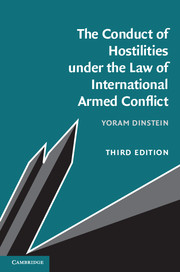Book contents
- Frontmatter
- Contents
- Introduction to the Third Edition
- Preface
- Table of cases
- Table of treaties
- List of abbreviations
- 1 The general framework
- 2 Lawful combatancy
- 3 Prohibited weapons
- 4 Lawful targets of attack
- 5 Protection from attack of civilians and civilian objects
- 6 Measures of special protection from attack
- 7 Protection of the environment
- 8 Specific methods of warfare
- 9 War crimes, orders, command responsibility and defences
- General conclusions
- Index of persons
- Index of subjects
6 - Measures of special protection from attack
Published online by Cambridge University Press: 05 April 2016
- Frontmatter
- Contents
- Introduction to the Third Edition
- Preface
- Table of cases
- Table of treaties
- List of abbreviations
- 1 The general framework
- 2 Lawful combatancy
- 3 Prohibited weapons
- 4 Lawful targets of attack
- 5 Protection from attack of civilians and civilian objects
- 6 Measures of special protection from attack
- 7 Protection of the environment
- 8 Specific methods of warfare
- 9 War crimes, orders, command responsibility and defences
- General conclusions
- Index of persons
- Index of subjects
Summary
Persons entitled to special protection
497. The previous chapter examined the general protection of civilians from enemy attacks. The present chapter will deal with a complementary protection afforded by LOIAC to certain categories of persons, both civilians and combatants, ‘either because they are regarded as especially vulnerable or on account of the functions they perform’. It must be underscored that the special protection granted to selected subsets of civilians (e.g., women and children) does not detract from the general protection embracing other civilians. That is to say, it is unlawful to attack even male civilians in the prime of their lives.
The different categories of beneficiaries
(a) Women
498. A host of provisions are included in the Geneva Conventions and in AP/I, designed to safeguard the rights of women. Article 27 (second paragraph) of Geneva Convention (IV) offers women special protection against any attack on their honour, in particular against rape, enforced prostitution or any form of indecent assault. This rule is reiterated in Article 76(1) of AP/I. But, whereas the former clause applies only to civilian women who are ‘protected persons’ in the sense of Geneva Convention (IV) – thereby excluding, primarily, a Belligerent Party's own nationals – the latter text covers all women without exception.
499. Article 8(2)(b)(xxi) of the Rome Statute brands as a war crime outrages upon personal dignity. This comprehensive provision evidently covers male victims as well, but its main thrust is the protection of women. The perpetration of rape, sexual slavery, enforced prostitution, forced pregnancy, enforced sterilization or other forms of sexual violence constitutes a war crime under Article 8(2)(b)(xxii). Enforced prostitution is already banned in Article 27 (second paragraph) of Geneva Convention (IV) and in Article 76(1) of AP/I (cited supra 498). Sexual slavery can be subsumed under the heading of slavery, the prohibition of which is commonly recognized to be a peremptory norm of contemporary international law (jus cogens). Forced pregnancy and enforced sterilization seem to be innovations of the Rome Statute. The most chronic form of sexual violence against women in wartime is, of course, rape. It ensues from the Delalić et al. Judgment, delivered by the ICTY Trial Chamber in 1998, that rape and similar sexual assaults against women are forbidden by customary international law. In the Kunarac et al. Judgment of 2002, the Appeals Chamber stressed that the young age of victims was an aggravating circumstance in the sentencing for rape.
- Type
- Chapter
- Information
- Publisher: Cambridge University PressPrint publication year: 2016



